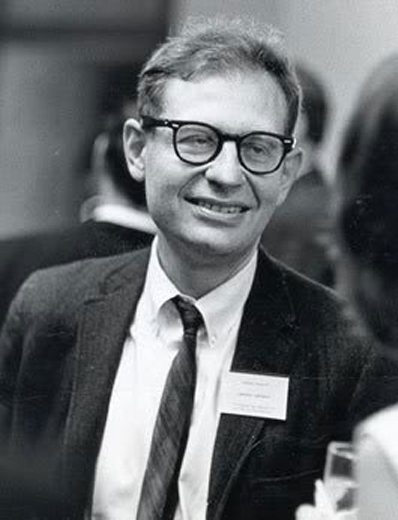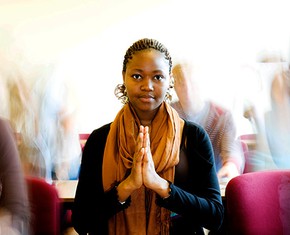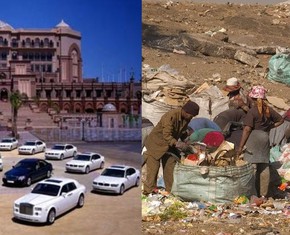The views expressed in our content reflect individual perspectives and do not represent the authoritative views of the Baha'i Faith.
He has showed you, O man, what is good. And what does the Lord require of you? To act justly and to love mercy and to walk humbly with your God. – Micah 6:8.
A man is not just if he carries a matter by violence; no, he who distinguishes both right and wrong and guides others, not by violence, but by the same law, being a guardian of the law, he is called just. – Buddha, the Dhammapada.
Four things support the world: the learning of the wise, the justice of the great, the prayers of the good, and the valor of the brave. – Muhammad, the Qur’an
That which traineth the world is Justice, for it is upheld by two pillars, reward and punishment. These two pillars are the sources of life to the world. – Baha’u’llah, Tablets of Baha’u’llah, p. 128.
Everyone who has raised children remembers them saying “But that’s not fair!” One of the very first life lessons every small child learns centers around those essential concepts: fairness and justice. Kids, as all parents know, have a particularly acute sense of justice and fairness.
When I protested about fairness as a child, my parents had a few standard responses: “Fair is where you go to see the pigs and the chickens,” or “Fare is what you pay to ride the bus.” I didn’t think they were funny. Poor families, I later figured out, don’t usually believe much fairness exists in the world.
We all learn, very early in life, that a full stomach, warmth, safety and security feel much better than hunger, cold, abuse and neglect. That feeling forms the basis of our early morality and the importance of fairness and justice in our conscience. If we behave well and reap the rewards, we quickly learn to do what we can to continue that behavior. If we misbehave and consistently earn the consequences, we will normally do what we can to stop that behavior. Optimally, we want the pleasure of rewards and don’t want the pain of punishment, and that leads us to understand and appreciate justice.
Psychologists call this mechanism moral reasoning, and the great thinkers Jean Piaget and Lawrence Kohlberg defined it as the basis of all ethical behavior. Piaget, and later Kohlberg, developed a theory of moral judgment and ethical behavior that focused on the lifelong developmental stages of the human conscience. Their justice-based theory, now widely accepted, says each person can potentially undergo six essential stages of moral development in life:
- Obedience and punishment orientation, which basically asks: “How can I avoid punishment?”
- Self-interest orientation, which asks “What’s in it for me?”
- Interpersonal accord and conformity, which follows prescribed social norms, and which Kohlberg called “The good boy/girl attitude”
- Authority and social-order maintaining orientation, known as “law and order morality”
- Social contract orientation, the idea that majority decisions and democratic institutions best serve a diverse humanity
- Universal ethical principles—when justice, other-directedness and an overarching concern for others directs our actions

Lawrence Kohlberg
Later in his life’s work, Kohlberg put forth the idea of a seventh stage, which he called Transcendental Morality, the union of moral reasoning with the higher calling and universal orientation of true religion.
These stages of moral growth, which we traverse as a part of our spiritual path in life, take us from childhood to adulthood, from an initial search for justice to the ultimate realization that we can find it in the universal oneness of all creation and the teachings of a transcendent Faith. When we progress through these stages of development, our conscience and our consciousness expands and enlarges to encompass progressively wider, more insightful and more unifying ways of understanding humanity and the world. As we climb the ladder of moral growth, we move from obedience out of fear, to doing the right things because they’re inherently right. Our conscience, just like our consciousness, matures.
Many people, however, get stuck at some of the earlier, conventional stages of moral development, and fail to advance to the later stages. Relatively few people, Kohlberg realized, make it to the higher stages of development, where they consistently act because they try to do what they see as morally right for all people, regardless of its personal advantage. That “universal,” transcendental morality stage—a highly evolved, essentially spiritual one—reflects the actions of our greatest cultural heroes, those we look up to for their wisdom, their courage and their guidance.
At the very pinnacle of that ladder of moral development the prophets and messengers of God—who consistently operate at the highest levels of a mature conscience—sacrifice their lives and their well-being so humanity can progress. Christ, Krishna, Moses, Buddha, Muhammad and now Baha’u’llah all lived their lives entirely for the benefit of humanity—despite the extreme sacrifices that required.
The Baha’i teachings offer us several examples of these kinds of stage-specific patterns of spiritual growth and development, including Baha’u’llah’s mystical books The Seven Valleys and The Four Valleys, which map the seeker’s spiritual path through several stages of spiritual and ethical maturation.
We learn, from these maps of maturation and development, that we can each personally work to open, widen and expand our spiritual reality. New vistas of understanding and comprehension can dawn on us, if we follow a path that continues to focus on the growth of our conscience and the ongoing maturation of our moral outlook. The Baha’i teachings call this path:
…the divine influence, the holy and spiritual revelations which insure eternal glory, everlasting happiness, the illumination of the world, the appearance of merciful phenomena in the world of humanity and perpetual life. The fundamental basis thereof is the teachings and the precepts of the Prophets, the dictates and attraction of the conscience which belong to the realm of morality. Like unto the lamp they illuminate and brighten the depths and recesses of human realities. – Abdu’l-Baha, Star of the West, Volume 9, p. 65.
You May Also Like
Comments

















or perversity. The arc of life is supposed to start with total egoism and end with as pure as possible altruism. Abdu'l-Baha spoke on that, and I think Hatcher & Martin followed these stages in "The Baha'i
Faith: The Emerging Global Religion".
especially "self-actualization", fits here, too.